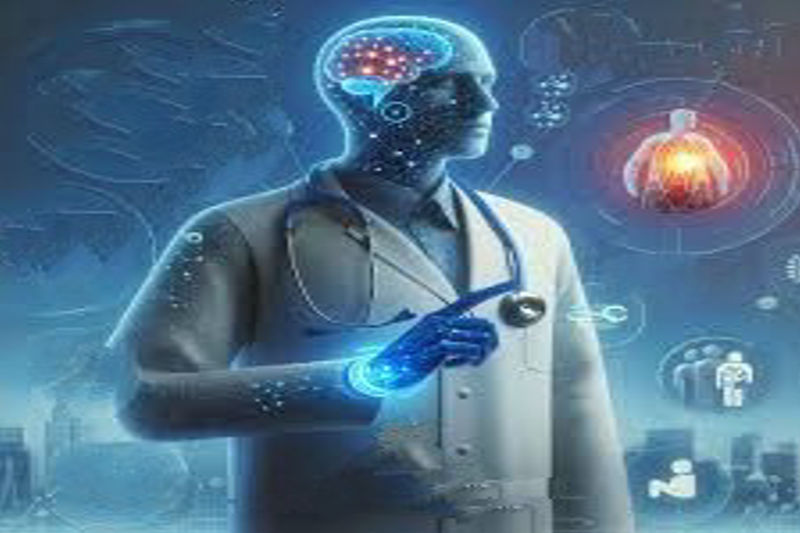Artificial Intelligence (AI) is revolutionizing industries across the globe, and medical sciences stand at the forefront of this transformation. From early disease detection to personalized treatment plans, AI is reshaping healthcare in ways previously unimaginable. The future of AI in medical sciences holds the potential to enhance diagnostics, streamline drug development, and even predict epidemics before they occur. But could this technological advancement truly change everything?
1. AI in Diagnostics: Faster and More Accurate Detection
One of the most fascinating applications of AI in medicine is in diagnostics . Conventional diagnostic techniques frequently depend on human judgment, which can be laborious and error-prone.. AI powered tools, however, can analyze vast amounts of medical data—such as imaging scans, genetic information, and electronic health records—with remarkable speed and precision.
Medical Imaging: AI algorithms, particularly deep learning models, are now capable of detecting abnormalities in Xrays, MRIs, and CT scans with accuracy rivaling or even surpassing human radiologists. For instance, AI systems like Google’s DeepMind have demonstrated success in identifying eye diseases and breast cancer at early stages.
Predictive Diagnostics: AI can analyze patient history and genetic data to predict the likelihood of diseases such as diabetes, Alzheimer’s, and cardiovascular conditions before symptoms appear.
With AI assisted diagnostics, healthcare providers can make faster, more informed decisions, reducing misdiagnosis rates and improving patient outcomes.
2. Personalized Medicine: Customizing Care for Each Patient
The concept of personalized medicine—where treatments are customized based on a patient’s genetic makeup, lifestyle, and environment—is gaining momentum, thanks to AI.
Genomic Analysis: AI can process complex genetic data to identify mutations linked to specific diseases, allowing for targeted therapies. Companies like IBM Watson Health are already using AI to recommend personalized cancer treatments based on genetic profiling.
Drug Response Prediction: Machine learning models can predict how a patient will respond to a particular medication, minimizing trialanderror prescribing and reducing adverse effects.
By leveraging AI, doctors can move away from a one size fits all approach, ensuring that treatments are optimized for each patient’s unique biology.
3. Drug Discovery and Development: Accelerating Breakthroughs
Developing new drugs is a lengthy and expensive process, often taking over a decade and billions of dollars. AI is transforming this landscape by:
Identifying Potential Drug Candidates: AI can analyze vast chemical databases to predict which compounds are most likely to be effective against specific diseases.
Optimizing Clinical Trials: Machine learning can help design more efficient clinical trials by selecting suitable participants and predicting outcomes, reducing costs and time.
For example, during the COVID19 pandemic, AI played a crucial role in identifying potential antiviral drugs and speeding up vaccine development. As AI continues to evolve, it could drastically shorten the timeline for bringing lifesaving medications to market.
4. Artificial Intelligence and Robotic Surgery
AI is also making waves in surgical procedures through robotic assisted systems.
Precision Surgery: Robots like the da Vinci Surgical System use AI to enhance a surgeon’s precision, reducing human error and enabling minimally invasive procedures.
Real Time Decision Support: AI can analyze real time data during surgery, providing surgeons with critical insights and alerts to improve outcomes.
While fully autonomous robotic surgeons may still be a distant reality, AI enhanced surgical tools are already improving success rates and recovery times.
5. AI in Public Health and Pandemic Forecasting
The COVID19 crisis highlighted the need for better pandemic preparedness. AI can be extremely important in:
Early Outbreak Detection: By analyzing data from social media, travel patterns, and health reports, AI can identify potential disease outbreaks before they spread widely.
Vaccine Distribution Optimization: AI can help allocate medical resources efficiently, ensuring vaccines and treatments reach high risk populations first.
Future AI driven public health systems could prevent global health crises by enabling faster responses to emerging threats.
Challenges and Ethical Considerations
Despite its immense potential, the integration of AI in medical sciences comes with challenges:
Data Privacy: AI relies on vast amounts of patient data, raising concerns about security and confidentiality.
Bias in AI Models: If trained on unrepresentative data, AI systems may produce biased results, leading to disparities in healthcare.
Regulation and Accountability: Clear guidelines are needed to ensure AI applications in medicine are safe, ethical, and transparent.
Addressing these issues will be crucial to harnessing AI’s full potential without compromising patient trust.
Conclusion: A Paradigm Shift in Healthcare
The future of AI in medical sciences is not just about incremental improvements—it’s about a fundamental transformation in how we diagnose, treat, and prevent diseases. From AI powered diagnostics to robotic surgeries and personalized medicine, the possibilities are endless. Even though there are still obstacles to overcome, the possible advantages greatly exceed the hazards.
As AI continues to evolve, one thing is clear: the future of medical sciences could indeed change everything, ushering in an era of smarter, faster, and more equitable healthcare for all.
Would you trust an AI doctor? The answer may soon become inevitable.


